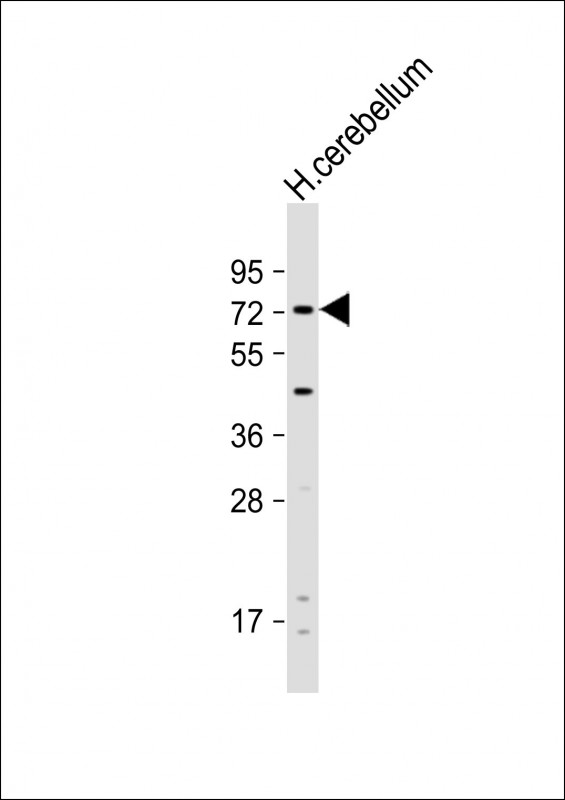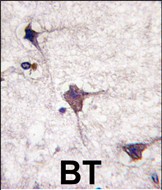PCPTP1 Antibody (N-term)
Purified Rabbit Polyclonal Antibody (Pab)
- 产品详情
- 实验流程
- 背景知识
Application
| IHC-P, WB, E |
|---|---|
| Primary Accession | Q15256 |
| Reactivity | Human |
| Host | Rabbit |
| Clonality | Polyclonal |
| Isotype | Rabbit IgG |
| Calculated MW | 73834 Da |
| Antigen Region | 234-265 aa |
| Gene ID | 5801 |
|---|---|
| Other Names | Receptor-type tyrosine-protein phosphatase R, R-PTP-R, Ch-1PTPase, NC-PTPCOM1, Protein-tyrosine phosphatase PCPTP1, PTPRR, ECPTP, PTPRQ |
| Target/Specificity | This PCPTP1 antibody is generated from rabbits immunized with a KLH conjugated synthetic peptide between 234-265 amino acids from the N-terminal region of human PCPTP1. |
| Dilution | IHC-P~~1:100~500 WB~~1:1000 E~~Use at an assay dependent concentration. |
| Format | Purified polyclonal antibody supplied in PBS with 0.09% (W/V) sodium azide. This antibody is prepared by Saturated Ammonium Sulfate (SAS) precipitation followed by dialysis against PBS. |
| Storage | Maintain refrigerated at 2-8°C for up to 2 weeks. For long term storage store at -20°C in small aliquots to prevent freeze-thaw cycles. |
| Precautions | PCPTP1 Antibody (N-term) is for research use only and not for use in diagnostic or therapeutic procedures. |
| Name | PTPRR |
|---|---|
| Synonyms | ECPTP, PTPRQ |
| Function | Sequesters mitogen-activated protein kinases (MAPKs) such as MAPK1, MAPK3 and MAPK14 in the cytoplasm in an inactive form. The MAPKs bind to a dephosphorylated kinase interacting motif, phosphorylation of which by the protein kinase A complex releases the MAPKs for activation and translocation into the nucleus (By similarity). |
| Cellular Location | Secreted. [Isoform Delta]: Cytoplasm, perinuclear region. Note=Locates to the perinuclear areas within the cytoplasm |
| Tissue Location | Detected in cerebrospinal fluid (at protein level) (PubMed:25326458). Expressed in brain, placenta, small intestine, stomach, uterus and weakly in the prostate. Isoform alpha has been observed only in the brain. Isoform gamma is expressed in brain, placenta and uterus. Isoform delta is expressed in brain, kidney, placenta, prostate, small intestine and uterus |
For Research Use Only. Not For Use In Diagnostic Procedures.
Provided below are standard protocols that you may find useful for product applications.
BACKGROUND
PCPTP1 is a member of the protein tyrosine phosphatase (PTP) family. PTPs are known to be signaling molecules that regulate a variety of cellular processes including cell growth, differentiation, mitotic cycle, and oncogenic transformation. This PTP possesses an extracellular region, a single transmembrane region, and a single intracellular catalytic domains, and thus represents a receptor-type PTP. The similar gene for this protein predominately expressed in mouse brain was found to associate with, and thus regulate the activity and cellular localization of MAP kinases. The rat counterpart of the gene for this protein was reported to be regulated by the nerve growth factor, which suggested a function in neuronal growth and differentiation.
REFERENCES
Blanco-Aparicio, C., et al., J. Cell Biol. 147(6):1129-1136 (1999).
Ogata, M., et al., J. Biol. Chem. 270(5):2337-2343 (1995).
Shiozuka, K., et al., Gene 162(2):279-284 (1995).
Sharma, E., et al., J. Biol. Chem. 270(1):49-53 (1995).
终于等到您。ABCEPTA(百远生物)抗体产品。
点击下方“我要评价 ”按钮提交您的反馈信息,您的反馈和评价是我们最宝贵的财富之一,
我们将在1-3个工作日内处理您的反馈信息。
如有疑问,联系:0512-88856768 tech-china@abcepta.com.























 癌症的基本特征包括细胞增殖、血管生成、迁移、凋亡逃避机制和细胞永生等。找到癌症发生过程中这些通路的关键标记物和对应的抗体用于检测至关重要。
癌症的基本特征包括细胞增殖、血管生成、迁移、凋亡逃避机制和细胞永生等。找到癌症发生过程中这些通路的关键标记物和对应的抗体用于检测至关重要。 为您推荐一个泛素化位点预测神器——泛素化分析工具,可以为您的蛋白的泛素化位点作出预测和评分。
为您推荐一个泛素化位点预测神器——泛素化分析工具,可以为您的蛋白的泛素化位点作出预测和评分。 细胞自噬受体图形绘图工具为你的蛋白的细胞受体结合位点作出预测和评分,识别结合到自噬通路中的蛋白是非常重要的,便于让我们理解自噬在正常生理、病理过程中的作用,如发育、细胞分化、神经退化性疾病、压力条件下、感染和癌症。
细胞自噬受体图形绘图工具为你的蛋白的细胞受体结合位点作出预测和评分,识别结合到自噬通路中的蛋白是非常重要的,便于让我们理解自噬在正常生理、病理过程中的作用,如发育、细胞分化、神经退化性疾病、压力条件下、感染和癌症。







